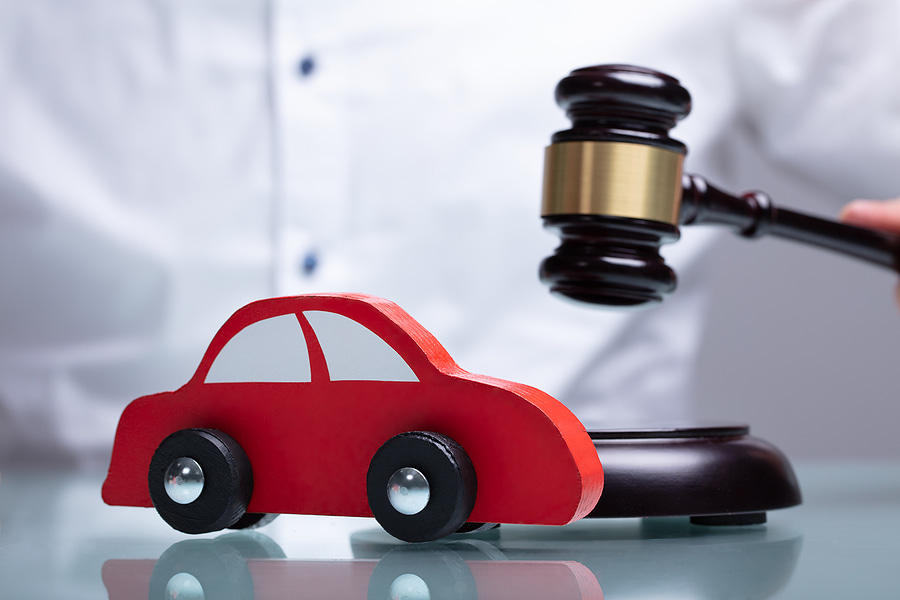
According to the National Highway Traffic Safety Administration, there are approximately 5.5 million car accidents in the U.S. every year. It may not surprise you to see how common car accidents are and how such accidents can result in personal injury or property damage and losses such as medical expenses, lost wages, and other expenses. However, it may surprise you to learn that most car accident cases do not make it to the courtroom.
Instead, approximately 90 to 95 percent of personal injury cases settle outside of court. If you have suffered an injury in a car accident, you are likely wondering if you should proceed with litigation or settle the case outside of court. A car accident settlement involves a legally binding contract between you (the injured party) and the other driver and their insurance company. In this process, you will release them of liability and your right to sue them in exchange for financial compensation.
Settlement Versus Litigation
It may seem that taking legal action through litigation is a good idea because it looks like a pathway that may seem promising and can potentially compensate you the most. However, it is vital to recognize the drawbacks of pursuing a case in court, which contribute to the low number of personal injury cases that make it to trial.
Disadvantages to Litigation
#1. A Slow Legal System:
When a personal injury case proceeds through state court, it can take time and several steps before your case will make it before a judge and a jury at trial.
Specifically, litigation moves very slowly, which most recently can be due to delays on the part of the court or a party's inaction. After Covid-19, courts put many cases and trials on hold as they figured out how to prioritize matters in the middle of a global pandemic.
#2. Litigation Costs Money:
Proving your case requires extensive documentation, such as medical records. As part of the discovery process, your attorney will collect, gather, and bring into evidence documents to make a strong case on your behalf.
All this effort and production takes time for the attorney to accomplish, which can come at a high cost for your legal fees.
Check with your attorney how the legal fee structure is affected if you choose a settlement. For example, you can lower your attorney’s contingency fee if you do not pursue litigation and avoid trial preparation expenses.
#3. No Guarantees:
While it may be true that a jury may award you fully and fairly to the maximum compensation amount you were seeking-there is no way to predict with accuracy and guarantee how a jury will see the facts.
Even reading about the award amounts that courts generally grant in a personal injury trial, these statistics cannot accurately capture what will happen under your unique facts and circumstances.
Overall, litigation is less predictable than a fair and just settlement.
#4. No Privacy:
If you want to keep your car accident case a secret, you may feel uncomfortable that court records are publicly available information. On the other hand, settlement agreements are sometimes confidential.
Disadvantages of a Settlement Agreement
Releasing Party From Liability:
When you agree to a settlement, you will likely agree to give up your legal right to pursue any further legal action now and in the future. As this is a contract you are signing, you are legally bound to this agreement.
Small Compensation Amount:
In exchange for absolving the other party from liability, you will receive financial compensation, but you will likely agree to lower compensation than you may have gotten in the courtroom.
Damages:
When you decide whether to settle, it is essential to know what damages you can pursue under state law and the pros and cons of pursuing litigation versus a settlement.
It is undoubtedly challenging to experience losses because of a car accident due to another's carelessness, such as driving while speeding or under the influence of alcohol. It can be even more distressing if you or a loved one have experienced severe injuries that greatly affect your daily life.
Examples of damages you may have suffered for which you can seek financial compensation may include:
- Bodily injuries such as injury to the neck, back, head, such as a traumatic brain injury
- Fixing or replacing your car
- The amount expended on medical bills
- Lost wages, and more
- Loss of love, support, consortium of a loved one who passed away in the car crash.
In some of the worst cases, we can lose a relationship and affection of a loved one because of another party’s wrongful act or negligence. In such cases, you may be especially interested in pursuing legal action on a wrongful death action basis. An attorney can explain whether meet the qualifying surviving family member criteria. Such an action can help you and your family heal and compensate you for your losses.
If you have suffered an injury in a car accident and want to pursue a lawsuit or resolve the case with a settlement, you must establish that you have injuries that the other driver caused.
Seek legal advice to ensure that you can effectively establish that your injuries exist. For example, an experienced personal injury attorney will discuss the documentation you collected and strategize which documentation you may need to build a strong case.
If you suffered an injury that caused out-of-pocket medical expenses for which you want compensation, your attorney may collect proof of your treatments and medical bills.
What a Personal Injury Case or Settlement May Cover?
Your settlement amount can vary based on the severity of your damages, the documentation you are keeping, and the skills of your attorney to negotiate on your behalf effectively.
Some of the factors to consider which can impact your compensation and that an attorney can help you navigate include:
- If you have an injury, the amount your case is worth can depend on the type of injury you have. Aside from physical pain, are you experiencing pain and suffering, psychological or emotional, from these injuries? Did you immediately seek medical attention for your injury? Do you have documentation to show your diagnoses and treatment plan?
- If you have an injury, the severity of your injury can affect your case. Is your injury minor or severe? What is your expected recovery period? Do you require long-term medical care?
- How much does your insurance cover these expenses? What does your insurance not cover? Are there available options for you through supplemental insurance coverage that can help? How does your state calculate or apportion fault, and how does this affect your payout and the outcome of your case?
- If you sustained injuries due to the car accident, and the other drivers have lower liability coverage limits than you, what are your options?
State-Specific Laws
Importantly, inquire about state-specific rules that may cap or limit you to specific damages. For example, no-fault law states allow injured parties to submit claims for severe injuries and for pain and suffering where they meet specific criteria.
Auto Insurance Liability Laws
State-specific laws will undoubtedly impact how you are compensated and affect the outcome of your case, depending on whether your state follows a fault or no-fault auto insurance liability approach. Whether one or both parties are at fault for causing the accident affects how much the other party’s insurance company is obligated to pay. In addition, insurance policy limits factor into a settlement offer. An experienced personal injury attorney can help you navigate negotiating with an insurance company.
If you are in a state like New York -a no-fault auto insurance state-you also can call your insurance and seek coverage. For example, if your car accident injuries require compensation beyond the other driver's available liability limits, you can file a claim with your own insurance policy. A knowledgeable attorney can ensure you have explored all the available options and insurance pathways to obtain compensation for your injuries.
Statute of Limitations
Seek legal advice to file a timely lawsuit or start settlement negotiations so you don't exceed your state's statute of limitations or the period in which you can bring a case or settle under your state’s car accident laws.
An experienced personal injury attorney can best advise you of your legal options. For example, New York permits a tolling of the statute of limitations period where a delayed injury affected the timeliness of your claim. Additionally, a knowledgeable attorney will know any exceptions that apply in your case.
Value of Legal Help
You can learn more about the pros and cons of pursuing a case or whether to settle your car accident case. You will be joining most litigants who settle their cases before going to trial.
If you are thinking about settling a car accident case outside of court, an attorney can help you understand how the settlement process works, including negotiation, payout, and disbursement. An attorney can determine if your financial status makes it in your best interest to pursue a time-efficient settlement, as court cases can take longer.
An attorney by your side can help to resolve your car accident case so that you can receive sufficient and acceptable financial compensation. Legal guidance to finalize a settlement or case will allow you to move forward and place yourself in the same position as before the accident.
An attorney can accurately calculate your damages to have a starting point for negotiations and help you understand that the amount you will finalize will likely be lower than what you desire.
If you don't agree with the settlement offer, your attorney can effectively negotiate a fair offer that sufficiently covers your losses.
Find a Personal Injury Attorney
Seeking the right attorney that meets your needs can start with asking for referrals to trusted friends, colleagues, and family. Additionally, you can get started by reading about and researching personal injury attorneys with experience taking on car accident cases. Sometimes their biographies list their background and experience with the litigation and settlement sides of the legal process.
Speak to Personal Injury Attorney
While you heal from your losses resulting from the accident, you can hire an experienced personal injury attorney to work on your behalf and ensure that you receive the fair and just financial compensation you deserve.
You can get started today by scheduling a consultation, which is generally free. An opportunity to meet with an attorney will allow you to learn more about your legal options and share the specifics of your case.
When deciding whether to pursue litigation or a settlement, remember that it is ultimately your decision, and you will have help from your attorney.
Specifically, the attorney can help you navigate the challenges associated with a car accident claim by considering the specific circumstances of your case. They will keep you informed along the way until you reach a decision you are satisfied with. Contact An experienced personal injury attorney can help guide you through making an informed decision as to what works best for you based on your circumstances.



